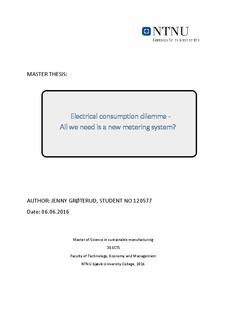Electrical consumption dilemma - All we need is a new metering system?
Master thesis
Permanent lenke
http://hdl.handle.net/11250/2411819Utgivelsesdato
2016-09-29Metadata
Vis full innførselSamlinger
Sammendrag
Electricity consumption are increasing, as our society keeps on growing. Due to climate changes and human impacts, it is clearly that we need to slow down this trend. One of the most important activity that each consumer can contribute due to this matter is to reduce our usage. This addresses a dilemma, in which human activity and realization of the need to change within consumption is a crucial factor in order to achieve effective usage. The European commission has reached out to the advanced metering systems (AMS) as part of a solution. Advanced metering systems (AMS) is a system that provide consumers and supplies information on real time consumption. EU aimed to equip at least 80% of all consumers with smart metering before 2020. Norway have followed this footstep as well, and according to NVE regulations §4-5 (42) advance metering system will be install for all electricity consumers in Norway by 1. January 2019 (42) It seems to exist a strong faith in AMS within public organs, and the aim of this thesis is to explore AMS technology and views of it at a consumer’s level. The research has focus on consumer groups within manufacturing companies and household. The scientific ambition of the research is to contribute to an understanding of our mindset, our attitudes towards the environment, AMS technology and energy consumptions. Another scientific ambition is to be a contribution for future research within energy and consumption field. The chosen method for this thesis is quantitative method. The main reason for the chosen method is because quantitative method represents larger crowd, and it contribute to form a basis for a systematic review of the consumers’ attitude towards AMS smart metering. The results reveals that it does not seems to exist as much faith as it may have been taken account for in AMS within consumers. However, these findings are subject to changes in the future. Findings reveals a common motivational factor due to changes within consumption as economic benefits. This benefit seems to be a driven factor in both groups of consumers. The research concludes that comparing to the metering system that exist today, AMS smart meter is an important investment that suits for the future. However, it does not necessary means that AMS itself can lead to less electricity consumption. In order to reduce consumption, require an interaction of human actions and technology development.
